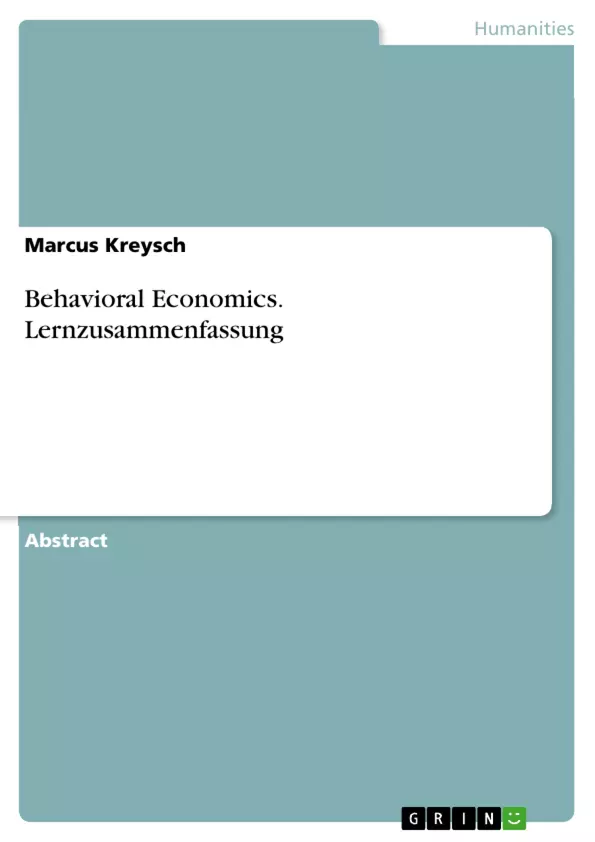Zusammenfassung der Mastervorlesung Behavioral Economics (Verhaltensökonomik) mit den Schwerpunkten: Behavioral Decision Theory, Behavioral Game Theory, Social Preferences.
Inhaltsverzeichnis (Table of Contents)
- Behavioral Decision Theory
- Expected Utility Theory
- Axioms of Expected Utility Theory
- Classical Anomalies
- Value formation
- Menu effects
- Status Quo and endowment effect
- Preferences reversals
- Probability judgment
- Representativeness heuristic
- Availability and anchoring heuristic
- Self-evaluation bias (egocentric bias)
- Prospect Theory
- General principles
- Loss Aversion
- Shape of the utility (value) function
- Decision weighting
- Mental Accounting
- Expected Utility Theory
- Intertemporal Choice and sustainable decisions
- The Discounted utility model (DUM)
- Assumptions and features of the Discounted utility model
- Some anomalies in the Discounted Utility Model (DUM)
- Alternative intertemporal choice models
- Time inconsistent preferences
- Hyperbolic discounting
- The Discounted utility model (DUM)
- Behavioral Game Theory
- Nature of (Behavioral) Game Theory
- Equilibrium concepts
- Bargaining
- Iterated dominance games
- Models of bounded rationality (limited cognitive capacity)
- Level-k-Model
- Cognitive Hierarchy Model
- Signaling
- Learning
- Social preferences
- Empirical evidence
- Factors affecting social preferences
- Modeling social preferences
- Inequality aversion models
- The inequality aversion model of Fehr & Schmidt, FS-Model
- The ERC-Model of Bolton & Ockenfels
Zielsetzung und Themenschwerpunkte (Objectives and Key Themes)
This text aims to provide an overview of the key concepts and theories within behavioral economics. It explores how individuals make decisions in different situations, considering factors such as risk, time, and social influences. The text examines the limitations of traditional economic models and presents alternative frameworks that better capture human behavior.
- Decision-making under risk and uncertainty
- Intertemporal choice and discounting
- Game theory and strategic interactions
- Social preferences and fairness
- Cognitive biases and heuristics
Zusammenfassung der Kapitel (Chapter Summaries)
The first chapter, "Behavioral Decision Theory," introduces the framework for understanding how individuals make decisions. It examines the limitations of traditional economic models based on rationality and introduces the concepts of expected utility theory, prospect theory, and other behavioral models that incorporate cognitive biases and heuristics.
The second chapter, "Intertemporal Choice and Sustainable Decisions," focuses on how individuals make decisions involving time, considering the trade-offs between present and future rewards. It discusses the discounted utility model and its limitations, exploring alternative models that account for time-inconsistent preferences and hyperbolic discounting.
The third chapter, "Behavioral Game Theory," explores how individuals interact strategically in games. It discusses equilibrium concepts, models of bounded rationality, signaling, and learning.
The fourth chapter, "Social Preferences," examines how individuals' preferences are influenced by social considerations, such as fairness, reciprocity, and inequality aversion. It explores empirical evidence, factors affecting social preferences, and various models that attempt to capture these social elements.
Schlüsselwörter (Keywords)
This text focuses on key concepts such as decision-making under risk, intertemporal choice, game theory, social preferences, bounded rationality, cognitive biases, heuristics, expected utility theory, prospect theory, discounted utility model, hyperbolic discounting, inequality aversion, and behavioral models.
Frequently Asked Questions
What is the focus of Behavioral Economics?
It studies how psychological, social, and emotional factors influence the economic decisions of individuals, often diverging from classical rational models.
What are common heuristics in probability judgment?
Key heuristics include representativeness, availability, and anchoring, which people use to simplify complex decision-making processes.
What is Prospect Theory?
Developed by Kahneman and Tversky, it explains how people value gains and losses differently, leading to loss aversion and non-linear decision weighting.
How does Behavioral Game Theory differ from classical Game Theory?
It incorporates bounded rationality and limited cognitive capacity (e.g., Level-k models) to better predict how people actually behave in strategic interactions.
What are social preferences in economics?
They refer to models like inequality aversion (Fehr & Schmidt), showing that individuals care about fairness and the outcomes of others, not just their own profit.
- Citation du texte
- Marcus Kreysch (Auteur), 2014, Behavioral Economics. Lernzusammenfassung, Munich, GRIN Verlag, https://www.grin.com/document/278066



